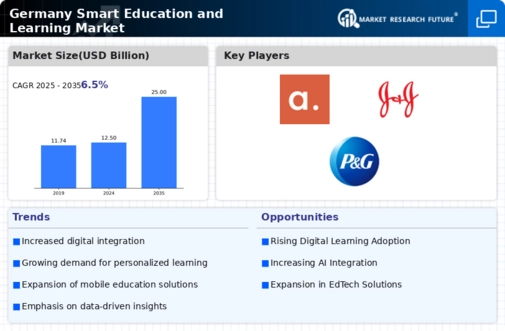Emphasis on STEM Education
The emphasis on Science, Technology, Engineering, and Mathematics (STEM) education is a critical driver in the Germany smart education learning market. The German government has recognized the importance of equipping students with skills relevant to the digital economy. Initiatives such as the MINT (Mathematics, Informatics, Natural Sciences, and Technology) initiative aim to promote STEM subjects in schools. This focus is evident in the curriculum reforms that prioritize hands-on learning and problem-solving skills. As a result, educational technology companies are increasingly developing resources and tools that support STEM education, thereby contributing to the growth of the market. The integration of smart technologies in STEM education not only enhances student engagement but also prepares them for future careers in a technology-driven world.
Government Initiatives and Funding
The German government actively promotes the integration of technology in education through various initiatives and funding programs. The DigitalPakt Schule, for instance, allocates substantial financial resources to enhance digital infrastructure in schools. This initiative aims to ensure that all educational institutions are equipped with modern technology, thereby fostering a conducive environment for smart education. In 2021, the government committed over 5 billion euros to this cause, indicating a strong focus on the development of the Germany smart education learning market. Such funding not only supports the acquisition of digital tools but also encourages the training of educators in utilizing these technologies effectively. As a result, the market is likely to experience growth driven by enhanced digital capabilities in schools.
Rising Demand for Digital Learning Tools
There is a notable increase in the demand for digital learning tools within the Germany smart education learning market. This trend is driven by the growing recognition of the benefits of technology-enhanced learning experiences. According to recent surveys, approximately 70% of educators in Germany express a preference for incorporating digital tools into their teaching methodologies. This shift is further supported by the increasing availability of diverse educational platforms and resources that cater to various learning styles. The market for e-learning solutions, including online courses and interactive applications, is projected to grow significantly, reflecting the changing landscape of education. As educational institutions adapt to these demands, the Germany smart education learning market is poised for substantial expansion.
Increased Focus on Data-Driven Decision Making
The growing emphasis on data-driven decision making in education is shaping the Germany smart education learning market. Educational institutions are increasingly utilizing data analytics to assess student performance and tailor learning experiences accordingly. This trend is supported by advancements in educational technology that enable the collection and analysis of vast amounts of data. Schools and universities are adopting learning management systems that provide insights into student engagement and achievement. Consequently, this data-centric approach allows educators to make informed decisions that enhance teaching effectiveness and student outcomes. As institutions continue to embrace data analytics, the demand for smart education solutions that facilitate this process is likely to rise, further driving the market.
Collaboration Between Educational Institutions and Tech Companies
Collaboration between educational institutions and technology companies is emerging as a significant driver in the Germany smart education learning market. Partnerships are being formed to develop innovative educational tools and resources that meet the evolving needs of learners. For instance, universities are collaborating with tech firms to create customized learning platforms that integrate artificial intelligence and adaptive learning technologies. These collaborations not only enhance the quality of education but also ensure that students are equipped with relevant skills for the workforce. As these partnerships continue to grow, they are likely to contribute to the development of cutting-edge solutions that address the challenges faced by educators and learners alike, thereby propelling the market forward.













